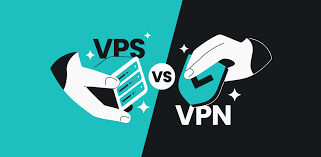Where privacy and accessibility often clash, two important players stand out: VPNs and VSPs. VPN (Virtual Private Network) and VPS (Virtual Private Server) present different ways to cater for online needs, but deciding which perfectly fits your specific needs can equally be as tiresome or annoying as navigating cryptocurrency web pages.
Consider any online actions your make as a writing of data boil into the stream of information on the Internet. A VPN plays like a cover which hides a digital trail of your data steps and keeps you away from any peeping Tom. Yet VPS is more like a personal island with dedicated area to carry out applications and websites secluded from the crowds of shared servers in the cloud.
In our journey towards Comparison of VPS with VPN, separate feature sets, and guide you in your quest for the most perfect service that will accompany you on future online travels. Therefore, above everything, are you someone who wants to remain anonymous in the online space or starting a dedicated VPS hosting, this our trip will lead you to the unknown VPN and VPS solutions.
What is a VPN?
A Virtual Private Network (VPN) is a technology that allows users to establish a secure and encrypted connection across a network that is less secure than a network like the Internet. It enables you to create encrypted connections to the internet which gives you an impression that you are private. Here’s how it works:
1.Encryption: Unless you connect to a VPN server your internet traffic will be encrypted. Hence each time your data passes through VPN servers, individuals and third parties alike will end up as unable to uncode, read or recognize your browsing data.
2.Secure Connection: From there the encrypting algorithm ensures that the data goes via an encrypted connection to the VPN server. Privacy is guaranteed such that nobody has the chance to access your data with the intent of stealing either by the hackers or government agencies.
3.Masking IP Address: On top of that, VPN conceals your IP address and makes it as if your IP is the one of the VPN server. This function of VPN masks your location and online identity from sites and apps by sending information through virtual hops (tunnelling).
What is a VPS?
VPS, known as Virtual Private Servers, is a virtual machine within a larger physical server that provides you with a private server dedicated to just your own use. It provides customers with their own instance of a virtual OS, and as admins they have root-level access to that operating system instance, so they can install almost any software that runs on that OS. Here’s how it works:
1.Virtualization: With the use of virtualization technology the the server is virtualized and being divided into multiple virtual servers. Each virtual server has a guaranteed resources and full independence in its operations i. e. , CPU functionality, RAM amount, and storage, and no interconnection with any other virtual server.
2.Isolation: Every VPS has its own defined separation, which allows it to be indisputably isolated from other virtual servers that can be deployed on the same physical server. This implies, that even in a situation that another VPS on the same server has a problem, Your VPS won’t be affected by that at all on the performance or security grounds.
3.Customization: Customers have the frame to customize their VPS based their needs instead of excess purchasing more RAM, bandwidth, disk space, or remote services. They can select whatever operating system, install whatever software, and configure the server options in line with their wish.
Comparison of VPS with VPN
Functionality:
VPNs do in most cases just that: secure your web connection, and hide your online activities. They are able to uphold this privacy matter through encoding your data and routing it via their servers which hide your IP address and location.
VPS, however, simulates server environment which is cloud-enabling. It means you either provision the resources for you and utilize as much as you want , dedicated resources like CPU , RAM, and storage, that is in an isolated , self-customized environment.
Performance:
VPN may bring along computational or transmission delay due to the time consuming process of encryption and rerouting of your internet traffic. This is an often a case in which speeds turn out to be considerably slower than the ones involved in a node-to-node connection, especially when it comes to long distances.
One of the primary advantages that VPSs is that they typically offer better performance especially for tasks that are memory intensive, since you have more resources that you can utilize. However, the main advantage is a lack of dependence on the host, while the real-life performance can be quite different, depending on the VPS configuration and the particular workload.
Security:
VPNs use the data encryption and the masking of the routing to stop the third parties including the snoopers to intercept your data. This includes hiding your IP address from viewing by websites and online services making your tracing of activities difficult.
VPSs will ensure the security of your apps and websites in a shielded environment for them. Given that you have the ultimate power on the server, you are able to customize your security to the maximum by utilizing to whatever extent firewall rules and software patches you see fit.
Ease of Use:
VPNs are usually easy to install, as the programs are quite aware and connecting to a server usually means launching a client application. Those are perfect for those who wish for a ready-to-use product that will grant them online anonymity.
VPSs are quite complex to initialize and to manage, especially for individuals having just a little technical skills. However, even though many VPS providers provide applications which enable the easy control over the VPS and management operations, a degree of technical expertise is still required.
Cost:
A VPN is normally the type of the subscription service where price varies on the basis of a provider and the features that he/she is about to offer. They are usually considered as cheap than VPSs, with that being said, these kind of product is ideal for individuals or small business owners that have limited budget.
VPSs are currently priced in accordance with the amount of resources, such as CPU cores, RAM, and storage available to you. Shields can cover more range than when VPNs are used, but they have more control and flexibility.However, they are more expensive for higher configurations, and this makes them expensive than VPNs.
Briefly speaking, VPNs rather aim for the establishment of a secure tunnel of connection over the internet where VPSs are an environment seeking to provide one with virtual servers for hosting websites and for application services to run. Services provided by these programs vary, based on their applications and benefits, and the development of one service over another depends on the circumstances.



